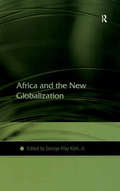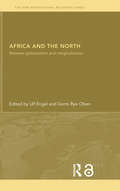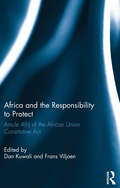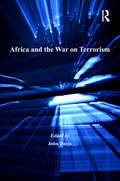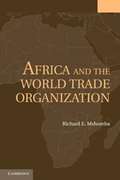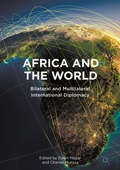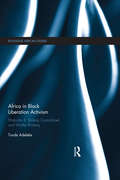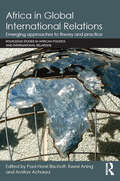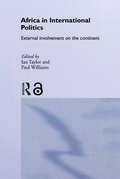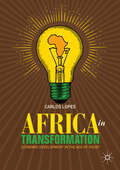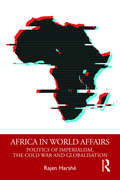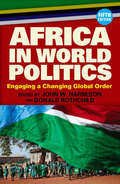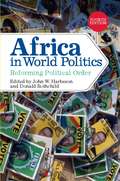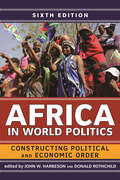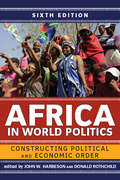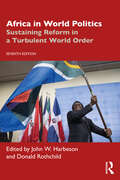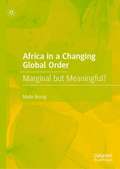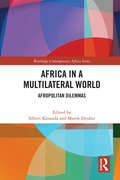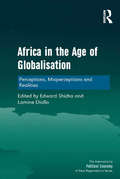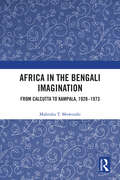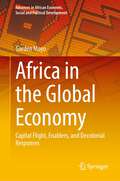- Table View
- List View
Africa and the New Globalization
by Jr. George Klay KiehGlobalization is not a new phenomenon in the international system. However, the various phases of globalization have had divergent scopes, actors, dimensions and dynamics - that is, each of the phases of globalization can be differentiated according to these terms. Against this background, this book focuses on the 'new globalization', a phase that emerged when the Cold War ended and which is, significantly, the most expansive and technologically advanced of all the phases of globalization. The contributors identify and discuss many of the frontier issues in Africa that are being impacted by the dynamics of this new globalization - debt, human rights, development, state sovereignty, the environment, and the HIV/AIDS pandemic. The volume will hold particular interest for students, scholars and researchers of African and development politics.
Africa and the North: Between Globalization and Marginalization (New International Relations)
by Ulf Engel Gorm Rye OlsenAn important new discussion of Africa's place in the international system. This volume discusses Africa's place in the international system, examining the way in which the Westphalian system, in light of the impact of globalization and transnational networks, continues to play a major role in the structuring of Africa's international relations.The book provides a solid empirical analysis of key global players in Africa - France, the UK, the US, Japan, Germany, the EU and the UN - and of their policies towards the region. In the context of the 'war against terrorism', African political stability becomes a consideration of increasing importance. By analyzing the relevance of the states in the North, this book challenges conventional wisdom in recent international relations thinking. It applies the concept of an 'international policy community' to bridge the gap between the 'domestic' and the 'international', explaining why Africa retains a role in global politics out of any proportion to its economic weight.
Africa and the Responsibility to Protect: Article 4(h) of the African Union Constitutive Act
by Dan Kuwali Frans ViljoenSituations of serious or massive violations of human rights are no longer purely of domestic concern, and sovereignty can no longer be an absolute shield for repressive governments in such circumstances. Based on this realization, the international community has recognized a responsibility to protect individuals in states where their governments are unable or unwilling to provide protection against the most serious violations. However, so far, only one intergovernmental organization, the African Union (AU), has explicitly made the right to intervene in a Member State part of its foundational text in Article 4(h) of its Constitutive Act. Although there have been cases of Article 4(h)-type interventions in Africa, the AU Assembly has not yet invoked Article 4(h) explicitly. This book brings together experts in the field to explore the potential application of Article 4(h), and the complexities that may explain its non-invocation so far. Although Article 4(h) is noble in purpose, its implementation faces several legal and policy challenges given that the use of force penetrates the principles of state sovereignty and non-intervention – the very cornerstones upon which the AU is founded. This book considers these issues, as well as the need to reconcile Article 4(h), in so far as it allows the AU to exercise military intervention to protect populations at risk of mass atrocities, with the provisions of the Charter of the United Nations. Drawing from the insights of law, political science, diplomacy and military strategy, the book offers a unique combination of multi-disciplinary expertise that harnesses the views of a diverse group of authors, focused on the legal, policy, and practical insights on the implementation of Article 4(h) and the responsibility to protect in Africa in order to provide concrete recommendations on how to end mass atrocities on the continent
Africa and the War on Terrorism
by John DavisAbject poverty and official corruption make parts of Africa a very attractive destination for terrorist organizations. Opportunities have developed during the pre- and post-9/11 periods in Africa for the recruitment of terrorists, attainment of bases of operations and sources of funding for Al Qaeda or its affiliated terror groups. This comprehensive volume provides an extensive examination of major terrorist events in Africa. It highlights internal and external indices to illustrate why Africa is so ripe for terrorism, ostensibly in terms of recruitment as well as attainment and sources of funding due to the continent's continuing poverty and corruption. The volume will prove indispensable reading for anyone researching security issues, political sociology and African studies.
Africa and the World Trade Organization
by Richard E. MshombaMshomba provides a systematic study of Africa as it relates to the World Trade Organization. He examines the WTO's enforcement mechanism; the WTO's broadened mandate, illustrated by the Agreement on Trade-Related Intellectual Property Rights; agriculture in the Doha Round; issues relating to transparency in government procurement; and the endeavor to streamline assistance to developing countries through an "Aid for Trade" initiative. The author integrates theory and practice, with a clear presentation of important economic concepts. He provides a rigorous analysis of key issues and proposals. He presents African countries as having an important role to play in the WTO, especially as they actively engage in bargaining through various coalitions. Mshomba acknowledges that WTO negotiations will always be complex and at times contentious due to wide economic and political differences between countries. He views the differences, however, as creating opportunities for a mutually beneficial exchange of goods, services, and ideas.
Africa and the World: Bilateral and Multilateral International Diplomacy
by Dawn Nagar Charles MutasaThis book probes key issues pertaining to Africa's relations with global actors. It provides a comprehensive trajectory of Africa's relations with key bilateral and major multilateral actors, assessing how the Cold War affected the African state systems' political policies, its economies, and its security. Taken together, the essays in this volume provide a collective understanding of Africa's drive to improve the capacity of its state of global affairs, and assess whether it is in fact able to do so.
Africa in Black Liberation Activism: Malcolm X, Stokely Carmichael and Walter Rodney (Routledge African Studies)
by Tunde AdelekeThis book revisits and analyzes three of the most accomplished twentieth century Black Diaspora activists: Malcolm X (1925–1965), Stokely Carmichael (1941–1998) and Walter Rodney (1942–1980). All three began their careers in the Diaspora and later turned toward Africa. This became the foundation for developing and solidifying a global force that would advance the struggles of Africans and people of African descent in the Diaspora. Adeleke engages and explores this “African-centered” discourse of resistance which informed the collective struggles of these three men. The book illuminates shared and unifying attributes as well as differences, presenting these men as unified by a continuum of struggle against, and resistance to, shared historical and cultural challenges that transcended geographical spaces and historical times. Africa in Black Liberation Activism will be of interest to scholars and students of African-American history, African Studies and the African Diaspora.
Africa in Global International Relations: Emerging approaches to theory and practice (Routledge Studies in African Politics and International Relations)
by Amitav Acharya Kwesi Aning Paul-Henri BischoffRecent scholarship in International Relations (IR) has started to study the meaning and implications of a non-Western world. With this comes the need for a new paradigm of IR theory that is more global, open, inclusive, and able to capture the voices and experiences of both Western and non-Western worlds. This book investigates why Africa has been marginalised in IR discipline and theory and how this issue can be addressed in the context of the emerging Global IR paradigm. To have relevance for Africa, a new IR theory needs to be more inclusive, intellectually negotiated and holistically steeped in the African context. In this innovative volume, each author takes a critical look at existing IR paradigms and offers a unique perspective based on the African experience. Following on from Amitav Acharya and Barry Buzan’s work, Non-Western International Relations Theory, it develops and advances non-Western IR theory and the idea of Global IR. This volume will be of key interest to scholars and students of African politics, international relations, IR theory and comparative politics.
Africa in International Politics: External Involvement on the Continent (Routledge Advances in International Relations and Global Politics)
by Paul Williams Ian TaylorLocating Africa on the global stage, this book examines and compares external involvement in the continent, exploring the foreign policies of major states and international organizations towards Africa. The contributors work within a political economy framework in order to study how these powers have attempted to stimulate democracy, peace and prosperity in the context of neo-liberal hegemony and ask whom these attempts have benefited and failed.
Africa in Transformation: Economic Development in the Age of Doubt
by Carlos Lopes“Lopes brings his rigour, insight, and experience to this timely new book, presenting a compelling rethink of traditional development models in Africa and the need to seize on transformational change to build a sustainable future for the continent."—Kofi Annan, former United Nations Secretary General “Some readers will enjoy Lopes’ eclectic brilliance and breath-taking culture. Others will salute his ability to bring compelling new angles to every topic. Everyone will be impressed with his craftsmanship, his rich and multi-faceted approach to development, and his high ethical standards. It is impossible to read this jewel book and not feel smarter.”—Célestin Monga, African Development Bank’s Vice President and Chief Economist “Drawing on his distinguished academic career, policy experience at the highest level, and deep love of the continent, Lopes provides a visionary analysis of Africa's current problems and future prospects. This book provides a highly unusual combination of intellectualism and hard-nosed pragmatism. A singular achievement.” —Ha-Joon Chang, University of Cambridge, UK“Thorough, thought-provoking, and beyond rhetoric: definitely a must-read for anyone who wants to understand Africa’s present and future.”—Enrico Letta, former Prime Minister of Italy, Dean of the Paris School of International Affairs, Sciences Po, France Lopes delivers an overview of the critical development issues facing the African continent today. He offers readers a blueprint of policies to address issues, and an intense, heartfelt meditation on the meaning of economic development in the age of democratic doubts, identity crises, global fears and threatening issues of sustainability.
Africa in World Affairs: Politics of Imperialism, the Cold War and Globalisation
by Rajen HarshéAfrica finds itself at the centre stage of world politics in the twenty-first century. To truly determine its rising influence and role in world affairs would mean unravelling the politics of imperialism, the Cold War and globalisation. Going beyond Euro-American perspectives, this book presents a comprehensive study of Africa and its role in world politics. Africa in World Affairs: • Closely examines the transition of Africa in its colonial and post-colonial phases; • Explores the intellectual history of modern Africa through liberation struggles, social movements, leaders and thinkers; • Investigates the continent’s relationships with former colonial powers such as Britain, France and Portugal; untangles complexities of French neo-colonialism and sheds light on the role of the superpower, such as the USA and major and rising powers like China and India; • Highlights complex and wide-ranging diversities of the region, and the ways in which it continues to negotiate with issues of modernity, racism and globalisation. A core text on Africa and the world, this book will be indispensable for students of African studies, politics and international relations, and history. It will also be a must-read for policymakers, diplomats and government think tanks.
Africa in World Politics
by Donald Rothchild John W HarbesonIn this fully revised edition top scholars in African politics address the effects that major currents in Africa and world politics have upon each other and explore the ramifications of this interconnection for contemporary theories of international and comparative politics.The fifth edition focuses on engaging a changing world order. The nation-state as we know it is a legacy of European rule in Africa, and the primacy of the nation-state remains the bedrock of most contemporary theories of international relations. Yet in the fifth decade of Africa's independence, this colonial inheritance has been challenged as never before by state weakness, internal and inter-state conflict, new gains in economic development, large investments by China and other G-20 countries, and internal and external demands for economic and political reform, with potentially far-reaching implications. Including six new chapters on warfare, bilateral vs. multilateral peacekeeping, Sudan, the Great Lakes Crisis, and China and Africa, this text remains an invaluable resource for students of African and world politics.
Africa in World Politics
by Donald Rothchild John W HarbesonIn this fully revised edition top scholars in African politics address the effects that major currents in Africa and world politics have upon each other and explore the ramifications of this interconnection for contemporary theories of international and comparative politics.The fourth edition focuses on issues of reforming and strengthening states and their economies in sub-Saharan Africa. The nation-state as we know it is a legacy of European rule in Africa, and the primacy of the nation-state remains a bedrock of most contemporary theories of international relations. Yet in the fifth decade of Africa's independence, this colonial inheritance has been challenged as never before by state weakness, internal and inter-state conflict, and internal and external demands for economic and political reform, with potentially far-reaching implications. Including new readings on the AIDS crisis in Africa and the regional war on terrorism, this text remains an invaluable resource for students of African and world politics.
Africa in World Politics
by Donald Rothchild John W HarbesonIn this fully revised edition top scholars in African politics address the effects that major currents in Africa and world politics have upon each other and explore the ramifications of this interconnection for contemporary theories of international and comparative politics.The fourth edition focuses on issues of reforming and strengthening states and their economies in sub-Saharan Africa. The nation-state as we know it is a legacy of European rule in Africa, and the primacy of the nation-state remains a bedrock of most contemporary theories of international relations. Yet in the fifth decade of Africa's independence, this colonial inheritance has been challenged as never before by state weakness, internal and inter-state conflict, and internal and external demands for economic and political reform, with potentially far-reaching implications. Including new readings on the AIDS crisis in Africa and the regional war on terrorism, this text remains an invaluable resource for students of African and world politics.
Africa in World Politics
by Donald Rothchild John W. HarbesonIn this fully revised edition top scholars in African politics address the effects that major currents in Africa and world politics have upon each other and explore the ramifications of this interconnection for contemporary theories of international and comparative politics. The fifth edition focuses on engaging a changing world order. The nation-state as we know it is a legacy of European rule in Africa, and the primacy of the nation-state remains the bedrock of most contemporary theories of international relations. Yet in the fifth decade of Africa’s independence, this colonial inheritance has been challenged as never before by state weakness, internal and inter-state conflict, new gains in economic development, large investments by China and other G-20 countries, and internal and external demands for economic and political reform, with potentially far-reaching implications. Including new readings on the Sudan, the Great Lakes crisis, and bilateral vs. multilateral peacekeeping on the continent, this text remains an invaluable resource for students of African and world politics.
Africa in World Politics
by HarbesonPolitical scientists and economists examine issues presented by the improvements in domestic economic and politics in sub-Saharan Africa and the emergence of the region onto the world stage. Among their topics are the heritage of colonialism, promising democratization trajectories in Africa's weak states, inter-African negotiations and reforming political order, and China's engagement in Africa. Annotation ©2008 Book News, Inc. , Portland, OR (booknews. com)
Africa in World Politics
by HarbesonIn this fully revised edition top scholars in African politics address the effects that major currents in Africa and world politics have upon each other and explore the ramifications of this interconnection for contemporary theories of international and comparative politics. The fourth edition focuses on issues of reforming and strengthening states and their economies in sub-Saharan Africa. The nation-state as we know it is a legacy of European rule in Africa, and the primacy of the nation-state remains a bedrock of most contemporary theories of international relations. Yet in the fifth decade of Africa's independence, this colonial inheritance has been challenged as never before by state weakness, internal and inter-state conflict, and internal and external demands for economic and political reform, with potentially far-reaching implications. Including new readings on the AIDS crisis in Africa and the regional war on terrorism, this text remains an invaluable resource for students of African and world politics.
Africa in World Politics: Constructing Political and Economic Order
by Donald Rothchild John W HarbesonThe sixth edition of Africa in World Politics focuses on challenges African states face in constructing viable political economies in contexts both of familiar domestic challenges and an unprecedented mix of engagements, opportunities, and threats emanating from a turbulent and rapidly changing international order. This text, including new chapters on Nigeria and the influence of party politics on economic development, remains an invaluable resource for students of African politics seeking to navigate the continent's complex political and economic landscapes. Revised chapters consider both the extent and the limits of continued healthy growth rates in many countries; the impacts of investments by China and other BRICS countries; plateaus and some reversals in progress on human rights and democratization; dimensions of chronic state weakness deepened by insurgencies, including some that are connected to Al Qaeda and the Islamic State; and peacebuilding efforts struggling to uphold responsible sovereignty in the Sudans, the Great Lakes region, and elsewhere.
Africa in World Politics: Constructing Political and Economic Order
by John W Harbeson,Donald RoThe sixth edition of Africa in World Politics focuses on challenges African states face in constructing viable political economies in contexts both of familiar domestic challenges and an unprecedented mix of engagements, opportunities, and threats emanating from a turbulent and rapidly changing international order. This text, including new chapters on Nigeria and the influence of party politics on economic development, remains an invaluable resource for students of African politics seeking to navigate the continent's complex political and economic landscapes. Revised chapters consider both the extent and the limits of continued healthy growth rates in many countries; the impacts of investments by China and other BRICS countries; plateaus and some reversals in progress on human rights and democratization; dimensions of chronic state weakness deepened by insurgencies, including some that are connected to Al Qaeda and the Islamic State; and peacebuilding efforts struggling to uphold responsible sovereignty in the Sudans, the Great Lakes region, and elsewhere.
Africa in World Politics: Sustaining Reform in a Turbulent World Order
by Donald Rothchild John W. HarbesonAfrica in World Politics provides advanced undergraduate and graduate students with the perfect introduction to the challenges faced by African states on an increasingly turbulent world stage. Africa in World Politics has long served as the go-to resource for students of African politics seeking to navigate the continent’s complex political and economic landscapes. Updated throughout, this new edition includes new chapters on the unprecedented challenges the continent faces from climate change and the fallout of the COVID-19 global pandemic. Adding to existing coverage of international diplomacy, peacebuilding, women in politics, and the building blocks of political economy, the book also includes expanded coverage of the role of China in Africa, and fresh perspectives on decolonization. Drawing together insights from some of the world’s leading scholars of African politics, this textbook is an essential read for advanced students of political science and African studies.
Africa in a Changing Global Order: Marginal but Meaningful?
by Malte BrosigThis book focuses on marginal actors in the global order. Such a perspective is often missing as global order analysis is often biased towards exploring large powerful actors and equating their relations with global order. Such an approach is not only dated but also analytically incomplete. It is because of the increasingly decentred nature of global order, that marginal actors and their relations, tactics, strategies and approaches matter for global order as they matter for these actors. The book starts by providing an analytical framework exploring different policy options for African agency which are located along a nexus of choices ranging from accommodation, engagement to system transformation. The selection of a particular interaction type is argued to be dependent on external opportunity structures in the form of different global orders reaching from competitive polarity to dispersed forms of authority or even non-polarity. In addition to these external conditions, the ability to generate meaningful African agency facilitates a greater role in global order. Empirically, the book covers four policy fields which are peace and security, international criminal justice, economics and trade and COVID-19.
Africa in a Multilateral World: Afropolitan Dilemmas (Routledge Contemporary Africa)
by Albert KasandaThe book analyses how Africans and Africa relate to other parts of the multilateral world, and to the world in general, and how these relations stem from local, national and regional interactions in different parts of Africa, as well as Africa as a whole. The first part focuses on the assumptions that are necessary to understand the role of Africa on the global stage, especially from the perspectives of political philosophy and global and international studies. The second part of the book looks at both Afropolitan trends and the limits of Afropolitanism. In the third part the authors focus on specific African global tendencies stemming from the local conditions in several case studies. Traditional and modern politics is connected, problematically, with the current Jihadist organisations in the local African conditions related to unilateralism and global war on terror, for example. The fourth part deals with the relevance of the language ambivalence in relation to global interactions. It examines various views of African philosophy and lays bare the perception of earlier colonial languages in view of their current strength of global action. This book will be of interest to scholars of African studies, political philosophy, politics and global studies.
Africa in the Age of Globalisation: Perceptions, Misperceptions and Realities (The International Political Economy of New Regionalisms Series)
by Edward Shizha Lamine DialloThis is a collection of bold and visionary scholarship that reveals an insightful exposition of re-visioning African development from African perspectives. It provides educators, policy makers, social workers, non-governmental agencies, and development agencies with an interdisciplinary conceptual base that can effectively guide them in planning and implementing programs for socio-economic development in Africa. The book provides up-to-date scholarly research on continental trends on various subjects and concerns of paramount importance to globalisation and development in Africa (politics, democracy, education, gender, technology, global relationships and the role of non-governmental organisations). The authors challenge the familiar paradigms in order to show how imperfectly, if at all, assumptions about globalisation and development theories have failed in their depictions and applications to Africa. The scholars in this volume both inform and advocate for a re-visioning of perceptions on Africa and how it navigates global processes.
Africa in the Bengali Imagination: From Calcutta to Kampala, 1928-1973
by Mahruba T. MowtushiThis book examines textual representations of Africa in the Indian imagination from 1928 to 1973. It critically analyses Bengali literature during this period, their imitation of colonial racial prejudices and how it allowed Bengalis to fashion their identity. It analyses the development of ‘Africa’ as an idea and historical reality through the writings of five Bengali writers including the Bengali novelist Bibhutibhushan Bandyopadhyay, the children’s author Hemendra Kumar Roy, the poet and philosopher Rabindranath Tagore, the playwright Ganesh Bagchi and the surrealist poet and founding editor of Transition magazine Rajat Neogy. The book shows how these writers engage with the idea of Africa and their influence in the construction of the Bengali cultural identity during the freedom struggle, the Partition of Bengal in 1947 and the creation of Bangladesh in 1971. The book offers readers a glimpse of the exotic imaginary locales of Africa while offering an in-depth look into the interconnected histories, cartographic routes and cultural exchange between India and Africa. A first of its kind, this book will be an excellent read for students and scholars of literature, comparative literature, history, cultural studies, postcolonial studies, South Asian studies, African studies and diaspora studies. .
Africa in the Global Economy: Capital Flight, Enablers, and Decolonial Responses (Advances in African Economic, Social and Political Development)
by Gorden MoyoThis book discusses the role played by powerful global institutions such as the IMF, the World Bank, the World Trade Organisation, multinational corporations, and the international credit rating agencies in keeping Africa marginalised in the world economy. The book focuses on the intrusive roles of these institutions as enablers and beneficiaries of capital outflows and financial subordination in Africa. Diverging from the official narrative that touts China and the other emerging economies as global reformers that are poised to partner Africa in its fight against financial subjugation, the book instead argues that, like the Western powers, the emerging economies are benefiting prodigiously from a rigged global financial system that keeps Africa as a net creditor to the rest of the world. The book draws its theoretical framework from the repressed heterodox theories including dependency, core-periphery, world systems and Marxist theories as well as the decolonial approach. It concludes with a call for a decolonial African agency that should champion an epistemic rebellion against the neo-liberal and neo-classic economic traditions that have been historically deployed to justify Africa’s subordinated position in the global economic governance. This book comes at moment in time when Africa is ready to become a Rule Maker not a Rule Taker. The analysis Dr. Moyo presents having been in the front line of public policy and international negotiations demonstrate the need for Africa to re-write the rules to foster our own Transformation. Jason Rosario Braganza, Executive Director, African Forum and Network on Debt and Development (AFRODAD)
